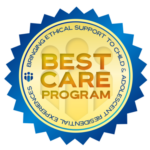After the heartbreaking realization that your teenager has a problem with alcohol or drugs, your initial reaction might be to blame yourself. Seeing someone so young struggle with substance abuse can make you wonder, “How could this happen to our family?” The first thing you should know is that addiction is a disease, and the second is that it’s not your fault.
Addiction Is Not a Moral Failure
As a parent, you want to do anything within your power to ensure your son grows up surrounded by love and happiness. You also want to equip him with the knowledge and tools to make good choices. However, a natural part of adolescence involves pushing boundaries to see how far they can go.
While teens often start experimenting with drugs and alcohol as an act of rebellion, that does not mean your child’s substance use is a direct reflection on your parenting. Addiction can happen at any age, and adolescents and young adults who are less capable of making rational decisions are especially vulnerable.
Why You Are Not to Blame for Your Child’s Addiction
Addiction is a complex brain disease with many contributing factors – including environment and genetics. However, these influences are only single pieces of an intricate puzzle. Even if substance misuse runs in your family and your son has grown up seeing you or other adults drinking or using drugs to cope with problems, that doesn’t mean you caused his illness or made it worse.
Imagine if your son had been born with a congenital disability or hereditary disease. In that case, you would likely experience many emotions, including sadness and anger, but you’d know that there was no reason to blame yourself. Instead, you would do everything you could to educate yourself about his condition so you could help him navigate life more comfortably. That empathetic lens is the same one you should use to view your teen’s addiction.
How to Talk to Your Teen About Addiction
If you’ve realized your child has a substance use disorder, it’s vital to talk to him about it so you can start exploring solutions as a family. Passively allowing your son’s drinking or drug use to continue is enabling, which will only make things worse over time. Here are some tips for proactively bringing up the topic and having a successful discussion.
- First, write down what you plan to say and practice it. Doing so helps you avoid making harsh or judgmental statements in the heat of the moment. Remember, no matter how angry or scared you might be, shouting and crying will not help.
- Timing and location are critical factors. Wait until your teen is sober before broaching the topic, and choose a place where you won’t get distracted or interrupted.
- Don’t turn the conversation into a guilt trip. He likely already feels extremely ashamed and remorseful about the pain he is causing you and your family. Adding to those burdens could make him use more alcohol or drugs to soothe the distress.
Healing Your Family
For all the joys of parenting, there are also many demands and challenges. Even if you’ve followed the prevailing advice about how to bring up a happy, well-adjusted child, there’s no such thing as a perfect parent. Almost everyone who has raised a child can recall some moments they wish they’d handled differently, and that’s OK.
Once you accept your teen’s illness is not your fault, you can start moving forward and making progress toward getting him treatment. At ARCH Academy, we provide hope and healing to young men and their families whose lives have been affected by drugs and alcohol. Our addiction professionals will help your son identify the root cause of his substance use disorder and provide your family with the necessary resources to support a healthy, sober lifestyle. Contact us today to learn more.




